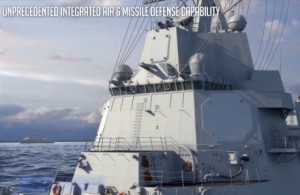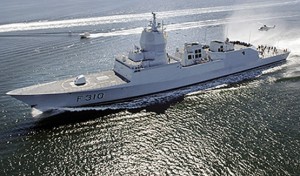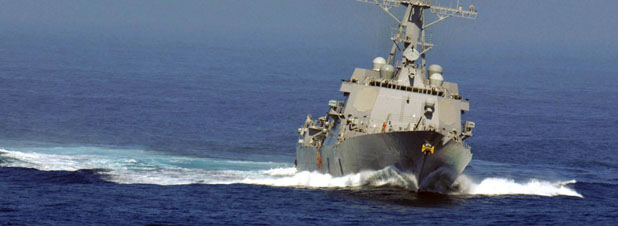As a civilian observer of naval affairs, I’m forever fascinated by the churn that surrounds every major platform design or acquisition. The nice thing about viewing all this from the cheap seats is a wider perspective – you get to look around just because you’re that much removed from the action on the floor. The downside is a lack of resolving power when it comes to details.
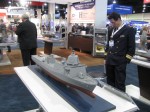
From the view up here in the nose-bleed section, I see some tantalizing glimpses. One that caught my eye recently was Huntington Ingall’s proposed LPD Flight II, which had among it’s variants, a very large Ballistic Missile Defense (BMD) platform. Does such a configuration make sense? Based on displacement alone, such an LPD doesn’t appear to be as constrained by hull space or power plant as the proposed Flight III, squeezing everything in. While the LPD Flight II wasn’t pitched as a arsenal ship, that’s a lot of deck space that could be filled with VLS packs or laser arrays. I can only imagine what additional strike capability might be gained should the Long-range Anti-ship Missile (LRASM) come to fruition.
Speaking of arsenal ships, the Navy should consider building a ship that can deliver naval gunfire and heavy strike missions. While the Zumwalt is a very expensive technology demonstrator, it will deliver base capabilities that should make it’s way into the next large combatant. It’s Total Ship Computing Environment (TSCE), tumblehome waveform, and the Advanced Gun System (AGS) all bring us one step closer to reaching those strike-mission goals. Whether or not we are facing the same threats for which the DDG-1000 was originally envisioned is another question – nonetheless, the Burke doesn’t have the capacity to fulfill those missions, period.
As for missions, Flight III is supposed to do two things well: BMD and Anti-Air Warfare (AAW). This brings us to the other half of the operational dilemma – it can’t do all the other missions the Navy must execute – certainly not well enough to justify putting it into a theater for the purpose of executing those other missions, where smaller or better equipped ships would suffice. The elephant in the room: there HAVE to be alternatives for operational commanders to the DDG-51 because it can’t do everything. It’s a specialist, and in the Navy’s “office”, the “all other duties” falls upon another class. For the forseeable future – that’s Littoral Combat Ship (LCS).

But this doesn’t mean Flight III is stuck in a rut. As unmanned aircraft and vessels make greater strides in autonomous performance, DDG-51 in a pinch could conceivably deploy in a limited operational zone, standing off safely while allowing it’s robotic minions to conduct Intelligence, Surveillance, and Reconnaissance (ISR) and other critical functions. And while it doesn’t meet the “payloads not platforms” call to a ‘T’, it does allow the venerable Burke design to remain versatile for the near future.
Other considerations: shipbuilding and the secondary/tertiary supply tiers that support the technology behind a modern military vessel are very perishable bases. It is vital to preserve this knowledge and the structure behind it in order to deliver sophisticated ships in the future. The only way to do so is to keep building complex weapons platforms; certainly a self-fulfilling prophecy (or a vicious cycle), but that is the operational reality. In the end, it really doesn’t matter if it’s Flight III or some other combatant, it just has to be built in frequent enough batches to sustain the industrial base.
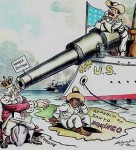
Finally, all talk of the cruiser-destroyer gap aside, there’s an emotional response to the idea that the U.S. Navy is shrinking. Coupled with the perception that a spanking new surface combatant is unable to adequately show the flag and you a have a situation that’s hard to stomach. And let’s face it – reputation risk is just as important as other operational risks. Carriers may overwhelm by their presence, but cruisers and destroyers deliver the diplomacy of gunboats – elegant and graceful when visiting solo but menacing enough to remind everyone watching about realpolitik.
Juramentado is the pseudonym for Armando J. Heredia, a civilian observer of naval affairs. He is an IT Risk and Information Security practitioner, with a background in the defense and financial services industries. The views and opinions expressed in this article are those of the author, and do not necessarily represent the views of, and should not be attributed to, any particular nation’s government or related agency.

